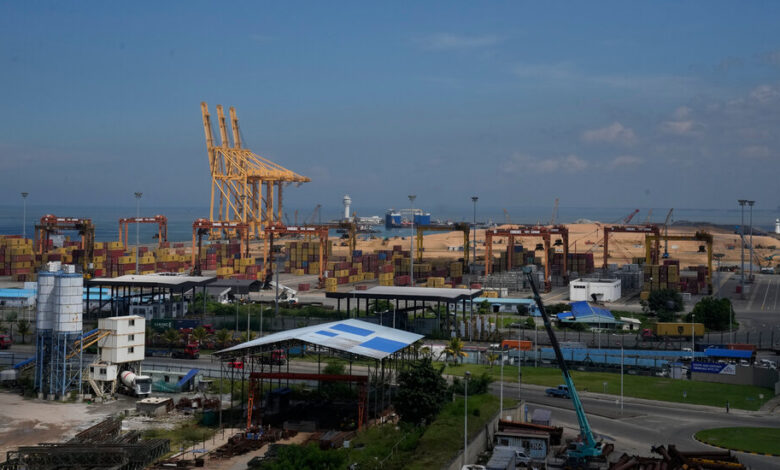U.S. Finance Agency Lends to Sri Lankan Port to Counter Chinese Influence

A U.S. foreign development agency announced on Wednesday it would lend $553 million to establish a deepwater shipping-container terminal at the Port of Colombo in Sri Lanka, expanding America’s effort to finance infrastructure around strategic parts of Asia.
The loan package is tied to Adani Ports, part of a conglomerate closely linked with Prime Minister Narendra Modi of India that is still wobbling from a short-seller’s attack in January. Adani will help develop the terminal with Sri Lankan partners.
The money from the U.S. International Development Finance Corporation resembles the kind of big-ticket deals that China’s development banks have struck around the world over the past decade. Under its Belt and Road Initiative, central to the foreign policy of President Xi Jinping, China made loans to build up ties around Asia, including in Sri Lanka. Now the United States, and to some extent India, intends to catch up — or even to improve on the Chinese record.
The Development Finance Corporation was created during the Trump administration to bankroll international infrastructure projects, cooperating with the State Department to support U.S. foreign policy and curb Chinese influence.
“The realities in this region and for global trade make this a critical addition to our global infrastructure,” Scott Nathan, chief executive of the U.S. agency, told a news conference in Colombo, Sri Lanka’s capital. He was joined by Karan Adani, the chief executive of Adani Ports and a son of the group’s founder, Gautam Adani, who went a step further in his comments, seeming to invoke defense considerations by saying the extra half-billion dollars symbolizes “regional security.”
As they took turns describing how the loan demonstrates America’s and India’s commitment to this debt-strapped island nation and to the rest of the Indo-Pacific, neither mentioned China by name, but they did not need to.
An international port project has special significance for Sri Lanka. Situated at a turning point between the Strait of Malacca and the Suez Canal, the country sees about half the world’s trading vessels pass by. Colombo’s port, the busiest on the Indian Ocean, has been working at 90 percent capacity for years.
Under the Rajapaksas, the ruling family that led Sri Lanka until the country’s economy collapsed in 2022, Chinese banks and engineering firms built a huge deepwater port at the island’s relatively remote southern shore. Hambantota, the name of that project, was the white elephant in the room during Wednesday’s inaugural declarations.
Built at a cost of more than a billion dollars and under terms that Sri Lanka could never repay, Hambantota, set in a stronghold of Rajapaksa political power, was eventually forfeited to China under a 99-year lease, along with 15,000 acres of nearby land. By 2020, before the pandemic disrupted trade, the port was handling just 1.2 million tons of cargo a year. Colombo’s port handles more than 30 million tons of cargo a year, and plans to quadruple that amount with new terminals.
Hambantota has become a hallmark of what President Biden called China’s “debt-trap diplomacy” at the first Americas Partnership for Economic Prosperity Leaders’ Summit in Washington last week.
Mr. Nathan told the news conference that the Biden administration’s investments in infrastructure “are transparent and don’t burden countries with debt at a sovereign level.”
India, too, has its eyes on China as it struggles to gain or retain influence around the rest of South Asia. Indian and Chinese diplomats have long tried to establish their country as the indispensable partner to Sri Lanka, Bangladesh and Nepal.
The U.S. loan is going to mean drawing closer to the way that India finances long-term projects. Under Mr. Modi, that has meant doing a great deal of business with the country’s top conglomerates. Among the most prominent is the Adani Group, which had seen its share price soar by 2,500 percent in five years until it was battered by a report released by the New York-based Hindenburg Research in January that accused the conglomerate of stock manipulation and accounting fraud.
Adani Group’s value cratered, and a public offering had to be canceled. At the time, the company accused its foreign critics of having made a “calculated attack on India” that expressed “contempt for Indian institutions.” Most of the conglomerate’s stocks are still trading far below their high point, and Mr. Modi no longer appears in public alongside Gautam Adani. But the conglomerate’s finances have steadied, and some of its constituent companies, including Adani Ports, have recovered their market value.
The Biden administration’s willingness to go into business with the Adani Group might burnish the company’s reputation abroad. Karan Adani said the port deal was a “reaffirmation by the international community of our vision, capability and our governance.”
Washington’s willingness to finance a complicated and strategic infrastructure deal also marks an advance for its ambitions in the region. It seems to confirm Mr. Adani’s view: “The relationship between Sri Lanka, the U.S. and India is multifaceted and holds great promise.”




